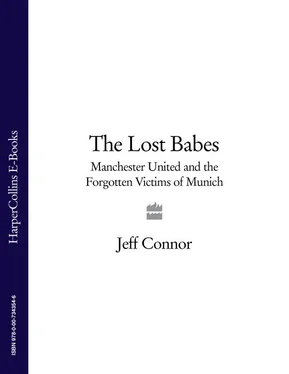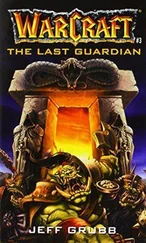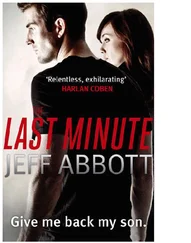Outside, we admired the small collection of wreaths and bouquets on the pavement below the plaque, including a bunch of irises from the Whelan family of Dublin who, via their friend Beryl Townsend in Manchester, commemorate their brother Liam in the same way every year before standing, in the archetypal north-west drizzle, for a minute’s silence at the fateful time of 3.04 pm.
The mourners, for that in essence is what we were, were a curiously eclectic bunch: the Chans, a group of five middle-aged men who had plainly taken time off work to remember the heroes of their youth, and youths for whom the only memories of the Busby Babes must have come from books, word of mouth, or flickering newsreel. The five older men stood in a convivial little circle, like veteran soldiers at a reunion, and I thought of approaching them to ask them their memories of 1958.
But I knew what they would say, for I would have offered the same stolid recollections—the time-frozen analogy with the assassination of Kennedy, ‘the day Manchester stood still’ and the enduring footballing view that ‘Edwards was the greatest player I’ve ever seen’. So I didn’t. Instead, I introduced myself to a lone teenager in a United replica tracksuit shivering on the periphery of the gathering. He had skived an hour from the shop on nearby Salford Quays where he worked and was there to represent his father, who was ill and missing his first Munich remembrance day in twenty years. The boy’s age, about eighteen, begged the obvious question: no, his father never saw the Busby Babes, but his father’s father had. Then, as others around us nodded their approval, he added with a sort of defiant conviction and in the flat, back-of-the-throat vowels of Salford: ‘But they were the greatest United team ever, weren’t they?’
After the minute’s silence, Gez Mason, a well-known United fan and a member of the pressure group Shareholders United, struck up the Flowers of Manchester , the song sent anonymously to a local newspaper after the plane crash and later recorded (they wouldn’t get away with this now) by the Liverpool folk group, the Spinners. It was as our choirmaster reached the last verse and the words ‘Oh, England’s finest football team, its record truly great; Its proud success mocked by a cruel turn of fate’ that the school children trotted round the corner of the East Stand at the same time as nine smartly dressed businessmen headed in the opposite direction towards the front office and one of the ground’s ten conference suites.
The groups passed each other almost precisely where I stood with the Chans. The children clutched their Manchester United plastic bags containing junior toothbrushes decorated with the logo of Vodafone, Ryan Giggs pencil sets, David Beckham keyrings and Roy Keane posters and stopped and stood still all at once; the suits marched past, hands in pockets, without breaking stride. It was an allegorical moment and a tableau that could be seen as a pertinent illustration of the Manchester United of today: its immutable history, corporate indifference to that history, massive worldwide fanbase, and purposeful beguilement of the very young.
Afterwards, a man about my own age, eyes still wet with tears, shook my hand and thanked me for coming, for all the world like the senior relative at a funeral service. Another complained that there had been no representative of the club, and no wreath from the plc, at the ceremony. I could have explained, but didn’t, that by then I had realized one thing about Manchester United—and by Manchester United I mean the faceless grandees located somewhere behind the glass round the corner and not the intangibility that is a football club—and that is that they prefer to confront Munich and its legacy on their own terms.
By 6 pm, when I vacated the Red Café and a plastic chair with the name of Scholes stencilled across its backrest to begin the long walk back up Matt Busby Way to the station, all the bouquets, wreaths and other mementoes had been removed. The mourning, seemingly, had been officially terminated.
Our little ritual had, as always, been mirrored elsewhere. In Belgrade, surviving members of Red Star’s 1958 generation, including captain Rajko Mitic and Lazar Tasic, who scored twice in the European Cup quarter-final against United, gathered in the club museum at the Marakana stadium to pay tribute to ‘Mancester Junajteda’. Mitic made a moving speech to laud rivals of so long ago, the British Consul was there and a letter was ceremoniously read out from Old Trafford director Sir Bobby Charlton, who could not attend: ‘This is indeed a sad day for both our clubs and I very much wished to be with you…to remember those who perished on that tragic day forty-five years ago. Unfortunately, circumstances have prevented me from travelling. On behalf of Manchester United Football Club, I send you our very best wishes and our thoughts are with you all.’
On a bitingly cold wet day in Dudley, the Black Country birthplace of Duncan Edwards, fresh flowers had appeared alongside those now withered and faded and a new collection of soaked red-and-white scarves and hats decorated the player’s black marble headstone at the town’s main cemetery on Stourbridge Road. Similar tributes appeared at the resting-places of the other seven lost players in various parts of Manchester, Salford, Doncaster and Barnsley.
The Whelan family, as always, met by Liam’s grave in Glasnevin Cemetery where forty-five years previously over 20,000 Dubliners—including the six-year-old future Taoiseach Bertie Ahern—had gathered to say farewell in an extraordinary outpouring of emotion; and in Munich, close to the site of the tragedy at the village of Kirchtrudering, the trough below the carved wooden figure of Christ had been planted with fresh flowers.
I had also learned by then that, for some, annual remembrance is never enough and that the wounds of loss that have lingered for almost half a century will never heal. June Barker, widow of the genial, warm-hearted centre-half Mark Jones, has been remarried for over thirty years, but says now: ‘Mark is buried just down the road from where we live in Barnsley and I can go and see him when I want, which is two or three times a week. On 6 February I am not fit to talk to, so I go with some flowers and just sit there a while. I’m not ever going to forget him.’
In nearby Doncaster, Irene Beevers, the sister of David Pegg, visits her brother at Adwickle-Street Cemetery every other week. And every other week for the last forty-six years she has found a single, fresh, red flower—usually a rose, sometimes a carnation—in the perforated holder at the base of the grave, placed there by someone with their own reasons to remember a boy who lived, and died, in a different lifetime.
Irene Beevers has never found out who, or why.
Manchester and its battered citizens came blinking back to daylight after May 1945, to find a city, and thousands of lives, altered irrevocably by war. As one of the largest industrialized conurbations in Europe, both Manchester and its twin across the River Irwell, Salford, were inevitable targets for German bombing raids and took a fearful pounding. The onslaught may not have been as prolonged as the London Blitz, but Manchester’s teeming terraced ghettoes stretched almost as far as the city centre and the Germans could hardly miss. On the night of Sunday 22 December 1940 alone, German bombers dropped 272 tons of high explosives and over 1,000 incendiary bombs on the two cities over a twenty-four-hour period. There was another, shorter, sortie the following night and in all, the two raids destroyed thirty acres within a mile of Manchester Town Hall, damaged 50,000 houses in the city and erased some of the city’s most famous landmarks, including the Free Trade Hall and the Victoria Buildings. Within a one-mile radius of Albert Square and its Town Hall, over thirty-one acres were laid to waste. Salford lost almost half of its 53,000 homes and neighbouring Stretford 12,000.
Читать дальше












